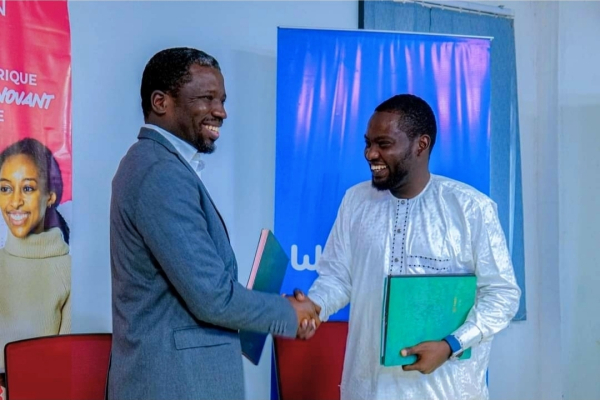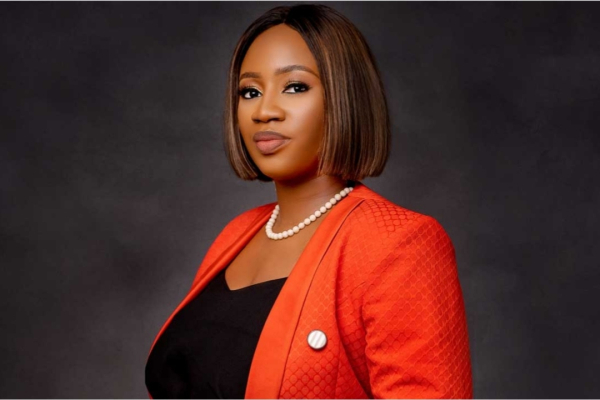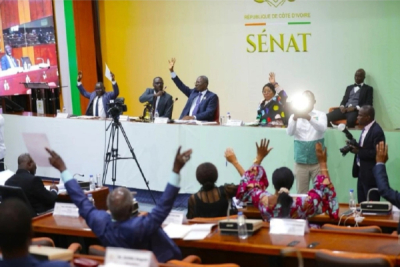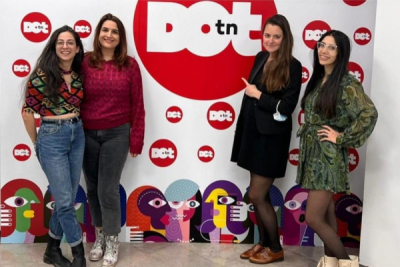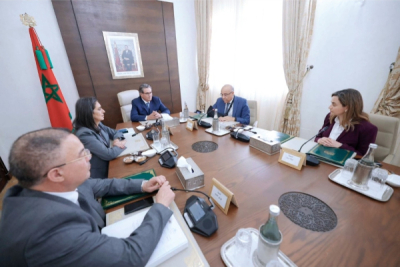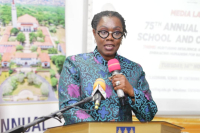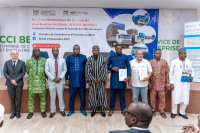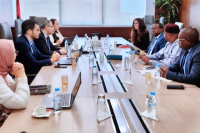To achieve its digital ambition, Chad, like most African countries, needs a qualified workforce. For that purpose, the country is actively forging partnerships to secure a skilled workforce, ensuring that its youth gain access to essential digital skills.
Simplon Africa, a social enterprise that provides training in digital professions, and WenakLabs, a tech hub in Chad, signed a partnership agreement in N'Djamena on Thursday, November 16.
One of the goals of this collaboration is to give the Chadian youth access to high-quality training in digital professions, improving their employability.
"This partnership shows a strong dedication to developing digital skills in Chad. By working together and sharing our expertise, WenakLabs and Simplon Africa want to create top-notch training courses, giving learners exceptional learning opportunities," said the Chadian hub.
Under the agreement, Simplon Africa will create the teaching content and provide learners access to its online training platform. On the other hand, WenakLabs will give access to its resources and training materials to support both face-to-face and online learning.
This collaboration will result in the launch of a campus in the next few months, offering both paid online and face-to-face training courses to its main targets: students, entrepreneurs, and professionals.
This new collaboration follows a previous partnership that led to the Tech4Tchad program in 2021. Funded by France, Simplon, and several partners, including WenakLab, Tech4Tchad has trained 150 young people in the digital field so far.
Samira Njoya
She is an inspiring woman dedicated to bridging the economic gender gap in Nigeria. Her exceptional leadership, innovation, and social impact have earned her numerous awards and distinctions.
Ife Durosimi-Etti (photo) is a Nigerian entrepreneur, author, and advocate for women's economic empowerment. As the founder and CEO of Herconomy, she leads a community platform providing financial services, professional opportunities, and training for women in Nigeria.
She graduated from Covenant University with a Bachelor's degree in Biochemistry in 2009 and earned a Master's degree in Global Business from Coventry University in 2012.
She initially launched Herconomy, in 2018, as AGS Tribe, a community dedicated to networking and empowering young female entrepreneurs and professionals. The community has now evolved to become a fintech company that empowers women through grants and scholarships. The company offers women savings opportunities. Through its academy, it offers online courses on entrepreneurship, business management, and digital, from coding to artificial intelligence to digital marketing.
"On our platform, you will not just save and earn high interests, but you will also save as you spend on things that you need on a day-to-day basis. We believe that women cannot be empowered through bank accounts alone, they need community, capacity and access to opportunities that can move them, their businesses or careers to the next level and we are providing just that through our platform. We are building a world where women can connect, save, earn and thrive," explained Ife Durosimi-Etti in 2022.
Herconomy is a community of over 100,000 women. The company has already awarded over 100 grants. In June 2023, it was selected for the third cohort of Google for Startups' Black Founders Fund.
A volunteer with the Global Shapers Community, Ife Durosimi-Etti is, since 2017, the project manager of Dome, a project launched to bridge the gender gap through the socio-economic empowerment of women in Nigeria. Before Herconomy, she co-founded Parliamo Bambini, a baby furniture marketing company in Nigeria.
She began her professional career in 2009 at Standard Chartered Bank where she was an Operations Analyst. A British Red Cross volunteer between 2010 and 2012, she was Customer Relations Manager for Arcadia Group, a fashion retailer in the UK, during the same period. Between 2012 and 2017, she worked at Nigerian Breweries Plc.
Her works have been celebrated with several awards. In 2017, she received an award from the Vivian Fowler Memorial College for Girls, in recognition of her contribution to women's empowerment. In 2018, she also received the Women's Advocacy Award from the West African Leadership Organization for her dedication to socio-economic development and equality in West Africa. In 2021, she was selected as a Mandela Washington Fellow, a flagship US government program for young African leaders.
Melchior Koba
Côte d’Ivoire, like several African countries, wants to set up a regulatory framework conducive to the development of innovative startups. The aim of this framework is to support local startups and spur the growth of the local tech ecosystem.
On Tuesday, November 14, the Ivorian Senate unanimously approved a law on the promotion of digital startups. Defended by the Minister for Digital Transition and Digitization, Ibrahim Kalil Konaté, before the Research, Science, Technology, and Environment Commission, it aims to define an incentive-based legal and institutional framework for the creation and development of young technology companies in Côte d'Ivoire.
"We have noticed that startups face some challenges as their models haven't been structured around proven business models that demonstrate market viability. Our goal is to provide support, incubate these startups, and help them realize their full growth potential," said Ibrahim Kalil Konaté.
The new law is part of the Ivorian government's efforts to encourage the emergence of digital startups in the country. Between 2020 and 2022, more than 2,847 digital entrepreneurs were supported by the Ivorian government, to the tune of more than 577 million CFA Francs ($960,000). Earlier this year, the executive also launched "Start-up Boost Capital", a 1 billion CFA Franc fund established to finance local startups.
Upon the President of the Republic's promulgation, this law will further fortify these initiatives. It is poised to catalyze the development of startups in their early stages, providing a dedicated framework for the support and governance of these enterprises. The overarching goal is to strengthen the entrepreneurial ecosystem, thereby accelerating socio-economic growth.
Samira Njoya
Africa has one of the largest underbanked populations in the world. To capitalize on the business opportunities offered by such potential markets and help populations access the services they need, financial services for those populations, startups (both local and international) are introducing increasingly disruptive solutions.
Konnect, a fintech solution created by a Tunisian startup, empowers users to seamlessly send and receive money, make online purchases, settle transactions with merchants or delivery drivers using QR codes, purchase airtime, and collect payment by generating payment links. Founded in 2021 by Amin Ben Abderrahman and headquartered in the city of Tunis, the startup has garnered approximately 500,000 Tunisian dinars (equivalent to around $160,540) in funding since its inception. These funds have been instrumental in advancing its technology and accelerating its growth.
The solution features a mobile application accessible on iOS and Android. Whether they are accessing the solution through its mobile or web platform, users are required to create an account as individuals, businesses, or startups. They will therefore be able to monitor real-time incoming payments, track income progression, receive transaction notifications, and access a secure private administration interface.
Konnect integrates Visa and Mastercard payment solutions as well as In Flouci, a solution developed by local fintech startup Kaoun. It charges 1.6% on deal value as transaction fees. In November 2023, it was selected with 22 other African startups for the Visa Africa Accelerator Program.
According to Amin Ben Abderrahman Konnect’s selection for the Visa Africa Accelerator program is a testament to the startup’s unwavering commitment to innovating and transforming the fintech sector in Tunisia. The Android version of the startup has already been downloaded more than a thousand times, according to Play Store data.
Adoni Conrad Quenum
The Dot offers a variety of support programs for startups. It has a significant impact on the entrepreneurial ecosystem in Africa. Its ambition is to become the spearhead of the Tunisian entrepreneurial ecosystem.
The Dot is a Tunisian digital innovation hub supported by Fondation Tunisie pour le Développement, an NGO that promotes socioeconomic development in Tunisia. Launched in January 2021 as part of a public-private partnership, it aims to federate the local entrepreneurial ecosystem, support innovation and digital transformation, and strengthen ties between Tunisia and Africa.
The innovation hub is headed by Zeineb Messaoud, a business developer and entrepreneurial program designer. It offers free programs and services to entrepreneurs, innovative project leaders, and companies wishing to expand into the African market.
These include Dot Camp, a mentoring program that selects 37 innovative startups in the seed phase each year. It offers a year's free accommodation, privileged access to other programs offered by The Dot, and networking and business opportunities.
The hub also provides a free resource center called Dot Services. This center features event rooms, a space for exchanging and sharing with a community of innovators, open-plan offices, and computers equipped with a range of creative and editing software. It also provides a studio equipped for podcast creation and audiovisual equipment.
Its support program Dot Landing is tailored for entrepreneurs within the Tunisian diaspora and foreign companies looking to establish a presence in Tunisia or forge partnerships and business connections across various sectors in the country. The free 4-month program provides intensive coaching to entrepreneurs.
Beyond its structured programs, The Dot aspires to serve as a hub for interaction, knowledge-sharing, and learning among diverse stakeholders in the entrepreneurial ecosystem. The organization regularly organizes events, workshops, training sessions, hackathons, conferences, and competitions designed to stimulate creativity, innovation, and collaboration.
The Dot has already supported several companies. These include 3D Wave, which specializes in 3D printing and digitization, the online business management platform Iberis, the interactive educational platform ClassQuiz and the Cynoia platform, which aggregates communication and collaboration tools on a single platform. For its activities, it is supported by Expertise France, GIZ, and Smart Tunisia, among other partners.
Melchior Koba
To bolster its digital transition program, Morocco requires a proficient workforce in digital professions. By ensuring the readiness of this workforce, the country wants to align the skills of its graduates with the dynamic requirements of the job market.
Morocco wants to triple the number of graduates in the digital sector within 4 years. To this end, an agreement was signed on Wednesday, November 15, by its Minister of Digital Transition and Administrative Reform, Ghita Mezzour (photo, right), the Minister for the Budget, Fouzi Lekjaa, and the Minister for Higher Education, Scientific Research and Innovation, Abdellatif Miraoui.
The agreement covers a program that equips graduates with digital specializations from Moroccan universities, spanning the period between 2023 and 2027. The objective is to elevate the number of graduates from the current 8,000 across various training cycles to 22,500 by 2027.
Notably, it provides for the launch of new digital training courses in 12 universities across the country. These courses will be broken down into 144 new fields of study, including data analysis, digital technologies, cybersecurity, program development, big data, and artificial intelligence (AI).
This interministerial project, which will take effect from the start of the next academic year, is part of the country's new digital strategy, which is currently being finalized. Dubbed "Maroc Digital 2030", it replaces the current strategy, which aims to make Morocco a benchmark digital and technology hub in Africa by 2025.
The new strategy places particular emphasis on talented, creative young people. It calls for the training of 45,000 digital talents per year, the introduction of 50,000 young people to digital professions, and the welcoming of 6,000 new foreign digital talents per year, among others.
Samira Njoya
The move is a strategic decision taken by Ghanaian authorities to help the University of Ghana’s students familiarize themselves with smart systems and cutting-edge technologies.
Ursula Owusu-Ekuful, Ghana's Minister of Communication and Digitalization, revealed on Tuesday, November 14, during the 75th annual New Year School Conference in Accra, the establishment of the Digital Youth Village at the University of Ghana. This initiative is designed to provide students with opportunities to engage with advanced technologies and intelligent systems.
"The Digital Youth Village for the New Year’s School is a project I am very excited about. The project would enable our students to have practical, hands-on learning about smart environments and smart offices alongside other cutting-edge technologies. Despite the challenges that have delayed the fruition of the project, I can confidently say that the Digital Youth Village for the New Year School and Conference of the University of Ghana will become a reality," said Ursula Owusu-Ekuful.
Ghana's authorities are actively advancing the nation's digital transformation by investing across various sectors to enhance the country's technology ecosystem. While not part of the continent's "Big Four" (Kenya, Nigeria, Egypt, South Africa), which collectively accounted for 67% of total startup fundraising in Africa during the third quarter of the year, as reported by TechCabal Insights in "The State of Tech in Africa Q3 2023," Ghana, under the leadership of Nana Akufo-Addo, is making significant strides. The United Nations Department of Economic and Social Affairs (UN DESA) "E-Government Survey 2022: The Future of Digital Government" positions Ghana as the seventh-ranked e-administration champion among sixteen leading nations on the continent. Additionally, earlier this year, Ghana joined the Digital Cooperation Organization, further underlining its commitment to digital progress.
During the November 14 event held under the theme Nurturing Resilience: Adopting Technology and Embracing Humanism for Sustainable Development," Minister Ursula also disclosed the various projects (both completed or underway) in the tech sector, including the Smart Community Project and The Rural Community Project.
"By embracing people-centered technology, Ghana will continue to strengthen its educational systems, healthcare services, and businesses and promote our own culture while empowering citizens to face the future with confidence and the requisite skills," added the Minister.
Adoni Conrad Quenum
Limited financial resources usually prevent some amputees from buying prostheses, therefore restricting their independence. In response to this issue, Nada Ghammem provides a solution by offering affordable, personalized bionic prostheses. Her innovative approach has earned her recognition and awards.
Nada Ghammem (photo) is a Tunisian entrepreneur and the founder/CEO of Bionic Soul, a startup that develops and manufactures advanced, personalized leg prostheses for amputees. She studied mechanical engineering at the Higher Institute of Technology Studies in Sousse from 2018 to 2021. She got the idea that would later lead to Bionic Soul (in 2022) during that period.
Through her company, she strives to offer a more cost-effective alternative to traditional prostheses without compromising product quality. Using advanced technologies, Bionic Soul designs its prostheses according to the measurements of each patient, who also benefits from personalized follow-up. Working in partnership with hospitals and customers to offer its services to as many patients as possible, the company also raises awareness of the importance of making bionic prostheses accessible to amputees.
Bionic Soul has developed two distinct types of prostheses. The first, ErgoLeg, is a mechanical prosthesis designed to provide fundamental mobility, equipped with a joint and a walking damper. This enables users to regain independence and resume their daily activities. Successful testing of this prosthesis version was concluded in October 2023.
The second option, BioniLeg, stands out as an intelligent bionic prosthesis incorporating sensors and an artificial intelligence algorithm. This advanced design offers users an almost natural, adaptive walking experience. Additionally, the company has created a dedicated app that allows users to customize their prosthesis settings, monitor their physical activity, receive personalized advice, and access valuable resources for both rehabilitation and maintenance of their prosthetic devices.
With Bionic Soul, Nada Ghammem won the international women's prize at the 13th edition of the international stage of Orange’s POESAM, which was concluded in October 2023. She received €20,000 in funding.
Currently, Nada Ghammem is a student at Enova ROBOTICS, a company specializing in the design and manufacture of robots through combined expertise in software, hardware, and perception. She began her professional career in 2018 as a student intern at the Centre Technique des Industries Mécaniques et Électriques (CETIME) in Tunisia. She also completed an internship in 2019 at Precimold Plastic Industries Sdn Bhd, a plastics company located in Malaysia.
Melchior Koba
The wave of digital transformation is sweeping across Africa, and Benin stands out as a commendable example. The country has initiated the digitization of a pivotal sector within its economy.
On Tuesday, November 14, Benin’s National Land Transport Agency (ANaTT) officially launched the Electronic Road Freight Management System (SYGFR). Financed to the tune of 290 million CFA Franc (around $479,480) by the Belgian Development Agency (Enabel), the platform provides sectoral stakeholders with an interface for real-time monitoring of road transport activities, freight transport especially.
Once completed, SYGFR will include three modules: freight supply management, statistics and dashboard management, and transport supply management. For the time being, authorities have launched the transport supply management module, which will among other things, facilitate the construction and maintenance of a database of professional drivers, the issuing of transport authorizations and transport cards, and registration of other freight players such as customs brokers and freight lessors.
In addition to facilitating the issuance of transport authorization and cards, the transport supply management module is expected to ease the issuance of consignment notes for freights from the Autonomous Port of Cotonou and other cargo hubs across the country.
"Effective organization is a prerequisite for the development of any sector. This [platform] is a stride forward and we need to embrace a collaborative thinking approach to meet ongoing challenges,” said Jacques Ayadji, who was representing Jose Didier Tonato, the Minister for the Living Environment and Transport in Charge of Sustainable Development.
Under President Patrice Talon, Benin has initiated the digitization of its services to become a tech hub in the West African region. The COVID-19 pandemic accelerated the process, and since then, more than a thousand services have been digitized. According to the United Nations e-government development index for 2022, Benin ranks 149th out of 193 countries, with a score of 0.4264, a leap of 8 places from 2020.
Adoni Conrad Quenum
In an era where digital technology is rapidly gaining global traction, the Chadian government is intensifying its endeavors to catch up in the sector. Numerous initiatives are in progress, and results are already perceptible.
Chad and Morocco will extend their bilateral cooperation in the field of information and communication technologies (ICT). To this end, a technical assistance memorandum of understanding has been signed between Chad's ICT development agency ADETIC, and Morocco’s telecom regulator ANRT.
The collaboration includes training for ADETIC engineers and exchanges of experience between the two agencies. The aim is to help Chad adapt and implement the Moroccan ICT model in favor of digital acceleration in the country, with a view to a prosperous digital economy.
The collaboration between the two regulatory agencies overseeing the telecommunications sector is a crucial component of the Chadian government's strategy to bridge the gap in the digital domain. This partnership materialized following a three-day mission by the ADETIC delegation to Morocco, during which they visited the host country’s digital development agency ADD and the ARNT.
"Most of the discussions focused on the Moroccan model for the digital transformation of public administration, the legal and regulatory framework, the management of ICT technical infrastructures, as well as domain name management and the provision of universal services," ADETIC wrote on Facebook.
This new partnership allows ADETIC to leverage the extensive expertise of ARNT, which boasts 25 years of experience in telecommunications sector regulation, approval of telecommunications equipment, administration of ".ma" domain names, and the management of electronic certification, among other areas.
Samira Njoya
More...
Technology advances offer unlimited job creation and development potential. To capitalize on those opportunities, fast-track technology adoption, and address the growing demand for skilled professionals in the evolving tech landscape on the continent, African countries are teaming up with international institutions.
The United Nations Development Programme (UNDP) and the Federal Government of Nigeria will collaborate to provide a significant boost to the country's tech sector. The Minister of Communications, Innovation and Digital Economy, Bosun Tijani announced the partnership on Tuesday, November 14 in a tweet.,
The partnership aims to offer 3,000 internship slots for participants in the Federal Government's tech initiative, 3MTT, which is designed to enhance skills and opportunities in the technology sector.
The 3,000 internship opportunities provided by the UNDP will catalyze individuals looking to gain hands-on experience in the dynamic field of technology. It not only offers a unique chance for personal and professional growth but also aligns with the broader goal of fostering a robust and competitive tech ecosystem in Nigeria.
The collaborative effort underscores the two parties’ commitment to bridge the gap between theoretical knowledge and practical application. By providing real-world exposure to aspiring tech professionals, this initiative is poised to make a tangible impact on the nation's tech landscape.
In a joint statement, representatives from both the UNDP and the Nigerian government expressed their enthusiasm for the partnership and its potential to drive positive change in the tech sector.
Hikmatu Bilali
South African proptech startup Neighbourgood announced, last week, the acquisition of Local Knowledge, another South African startup operating in the travel technology industry. The deal is worth $1.5 million.
South African insurtech Pineapple announced on Thursday, November 16, via its social networks, the successful completion of a 400 million rand (approx. $21.9 million) Series B funding round. "This funding round stands as a testament to our tech and AI-powered operating model, enabling our mission to offer affordable and comprehensive insurance to all South Africans," said Pineapple co-founder Marnus van Heerden.
mHub, a key player in Malawi's technology ecosystem, promotes innovation and entrepreneurship. It has already created a thousand jobs and trained tens of thousands of young people.
mHub is Malawi's first technology and innovation hub, located in Lilongwe, with workspaces in Blantyre (Malawi) and Lusaka (Zambia). Founded in 2014, the hub's mission is to promote technology, entrepreneurship, and innovation in Malawi. It offers tailored technology solutions, entrepreneurship support, and digital skills training for Malawian youth and businesses.
The center was initiated by Rachel Sibande, a Malawian computer scientist and social entrepreneur. A fervent advocate of technology in Africa, she was featured on the Forbes list of Africa's 30 most promising young entrepreneurs in 2016.
mHub offers creators tailored entrepreneurial support, software development services, co-creation opportunities, digital skills, and on-demand startup assistance. It also hosts programs and activities to strengthen Malawi's entrepreneurial and innovative ecosystem. One such program is Digital Malawi, a project that has benefited over 500 young people, some of whom have received funding of around $2,500 as seed capital for their businesses.
The Modern Cooking for Healthy Forest Accelerator (MCHF), a project aimed at improving forest management and mitigating land-based emissions, is another of the center's initiatives. It has trained 94 entrepreneurs and linked 20 participants with beneficiaries, thereby contributing to sustainable forest management.
In partnership with Care Malawi, mHub has also set up a project called Ntchito Mbambande. This focuses on improving employability and self-employment opportunities for young people. It is mainly funded by the European Union (EU) and operates in five development districts: Blantyre, Machinga, Salima, Dedza, and Mzimba.
Since its inception, mHub Malawi has facilitated over $1 million in funding for emerging entrepreneurs, created over 1,000 jobs, and trained over 42,000 young people in business and technology. In 2018, mHub won the Most Innovative Organization award at the Cloud Awards and the IOT Awards.
Melchior Koba


